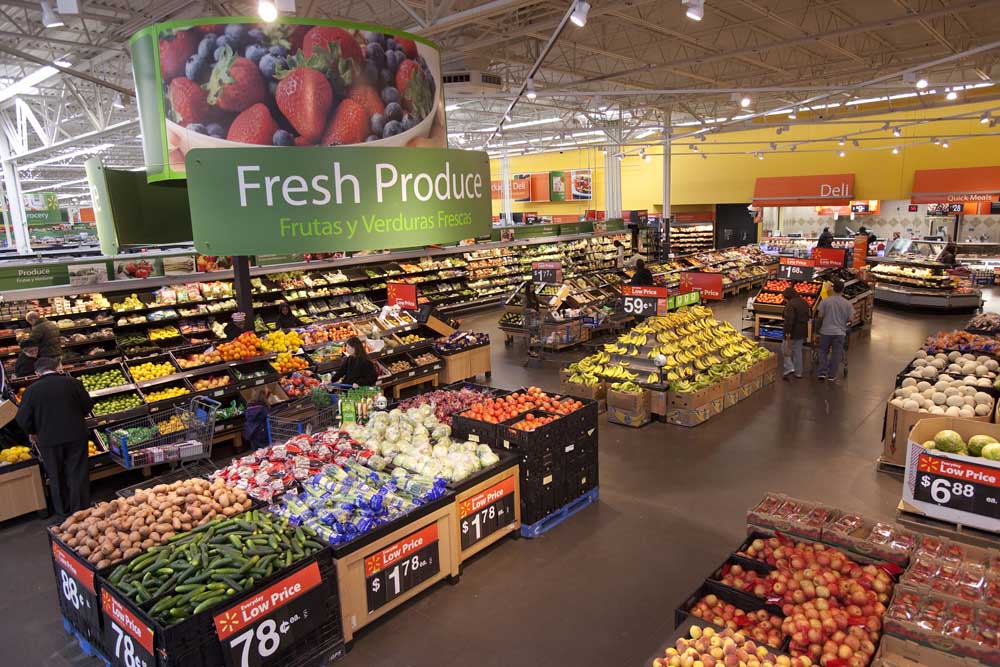Walmart to track veggies via blockchain
Published 12:00 am Tuesday, September 25, 2018

- A Walmart produce section. (Nadav Neuhaus/The New York Times)
When dozens of people across the country got sick from eating contaminated romaine lettuce this spring, Walmart did what many grocers would do: It cleared every shred off its shelves, just to be safe.
Walmart says it now has a better system for pinpointing which batches of leafy green vegetables might be contaminated. After a two-year pilot project, the retailer announced Monday that it would be using blockchain, the type of database technology behind bitcoin, to keep track of every bag of spinach and head of lettuce.
Trending
By this time next year, more than 100 farms that supply Walmart with leafy green vegetables will be required to input detailed information about their food into a blockchain database developed by IBM for Walmart and several other retailers exploring similar moves.
The burgeoning blockchain industry has generated a great deal of buzz, investment and experimentation. Central banks are exploring whether it would be good for tracking money flows. Eastman Kodak has explored a blockchain platform that could help photographers manage their collections and record ownership of their work, while a group of reporters and investors are using the technology to start a series of news publications.
But essentially the only real-world uses have come from cryptocurrencies like bitcoin, which use their own blockchains to store transactions. Walmart is now trying to bring blockchain into the lexicon of everyday consumers.
“It is the first real instance of doing this at scale,” said Brigid McDermott, vice president of IBM Blockchain.
For Walmart, the initiative fits squarely into two key strategies: bolstering its digital savvy and emphasizing the quality of its fresh food to customers.
The blockchain could also save Walmart money. When another foodborne illness hits — like the E. coli outbreak affecting romaine — the retailer would only have to discard the food that was actually at risk.
Trending
IBM is trying to position itself as a leader in the emerging technology of blockchains. It is competing with established companies like Microsoft and upstarts like Ethereum, which have developed projects in areas as varied as financial trading and music rights.
The Walmart effort will take time to roll out. In the meantime, it is likely to face questions from critics of the technology, who are skeptical of whether the blockchain is being developed by corporations are all that different from old-fashioned online databases.
“I can’t see how doing this in a blockchain data format will make this magical in any way,” said David Gerard, the author of “Attack of the 50 Foot Blockchain.”
“I think it’s mostly a PR move, so these companies can sell themselves as blockchain leaders,” he said.
Walmart’s embrace of the blockchain highlights how difficult it still is for grocers, including the nation’s largest, to keep track of their food.
Last year, Walmart conducted an experiment trying to trace the source of sliced mangos. It took seven days for Walmart employees to locate the farm in Mexico that grew the fruit. With the blockchain software developed by IBM, the mangos could be tracked in a matter of seconds, according to Walmart.
“The food chain is not always linear,” said Frank Yiannas, vice president for food safety at Walmart.
The original blockchain was the online database on which all bitcoin addresses and transactions were stored. The database is maintained and stored by a network of volunteer computers, so that no single institution, like a bank, is required to keep the records. Because several computers have the records, it is much harder to change or fudge the data after the fact.
Many large global corporations have studied how they might use a similar database design to keep records among a wide array of parties — like the hundreds of people involved in moving spinach from the farm to the grocery shelf.
The blockchains being tested by companies, including the version adopted by Walmart, generally have nothing to do with bitcoin or any cryptocurrency — they are entirely new databases with no coins involved. And unlike the bitcoin blockchain, which can be viewed by anyone, only certain people will be able to view and access the Walmart database.
The system that Walmart is using, IBM Food Trust, has been developed for consumer companies, including Dole, Wegmans and Unilever, to track products moving through the supply chain.
At each stop along the way, people handling produce for Walmart will make an entry on the blockchain, signing off when they receive it and then when they move it onto the next person in the chain. IBM and Walmart say they are already tracking other products like yogurt and poultry on the system.
Blockchains are supposed to make it possible to keep updated databases without any central authority in charge. But currently, all of the records for the Walmart blockchain are being stored on IBM’s cloud computers, for Walmart’s use. That has led to questions about why a distributed database like a blockchain is even necessary.
“The idea is right but the execution seems off,” said Simon Taylor, the co-founder of 11:FS, a consulting firm that advises companies on blockchain adoption. “IBM took new tech that doesn’t need a middleman and made themselves the middleman.”
McDermott said that the data would be encrypted in a way that will make it impossible for IBM to access or change it.








